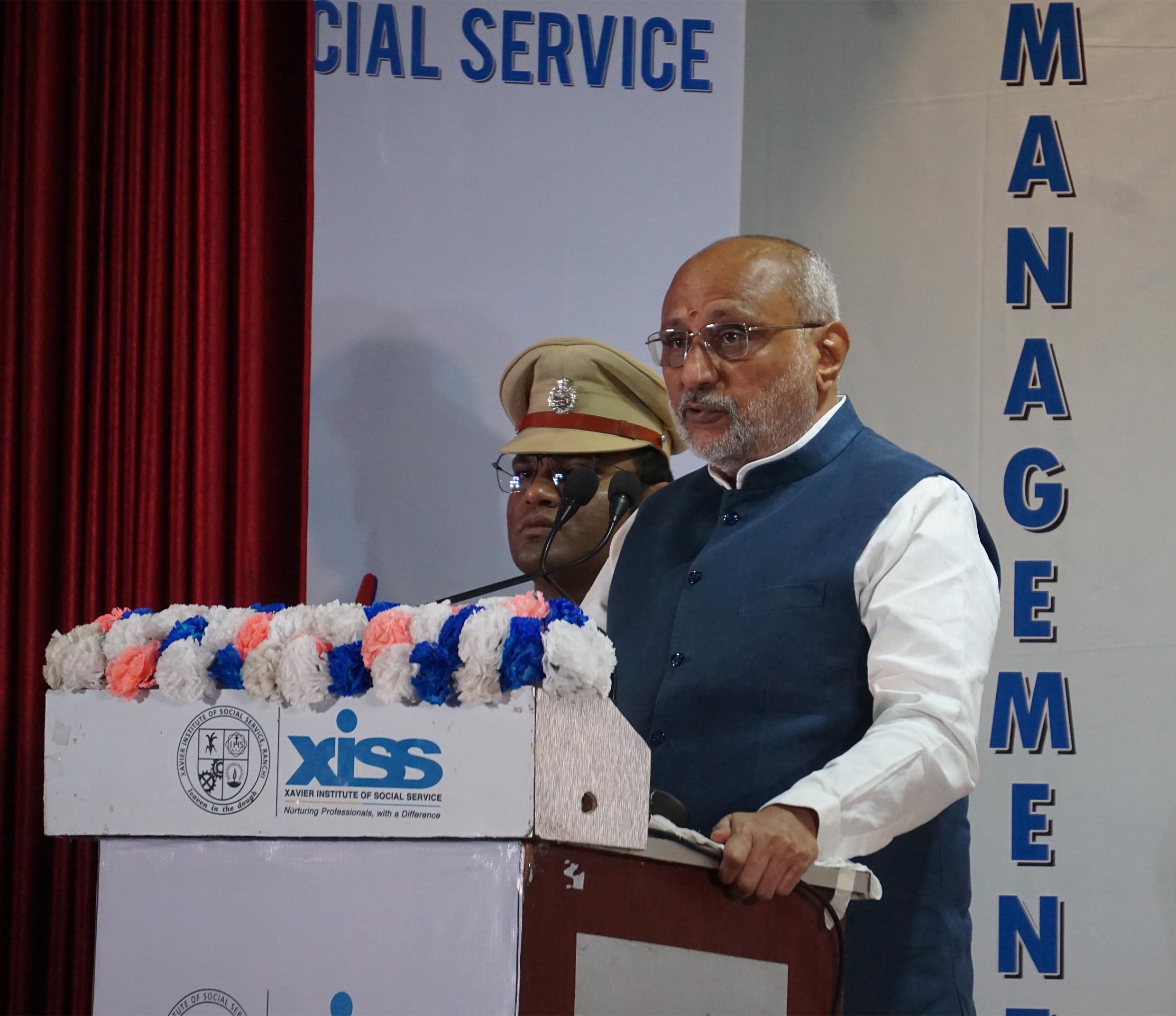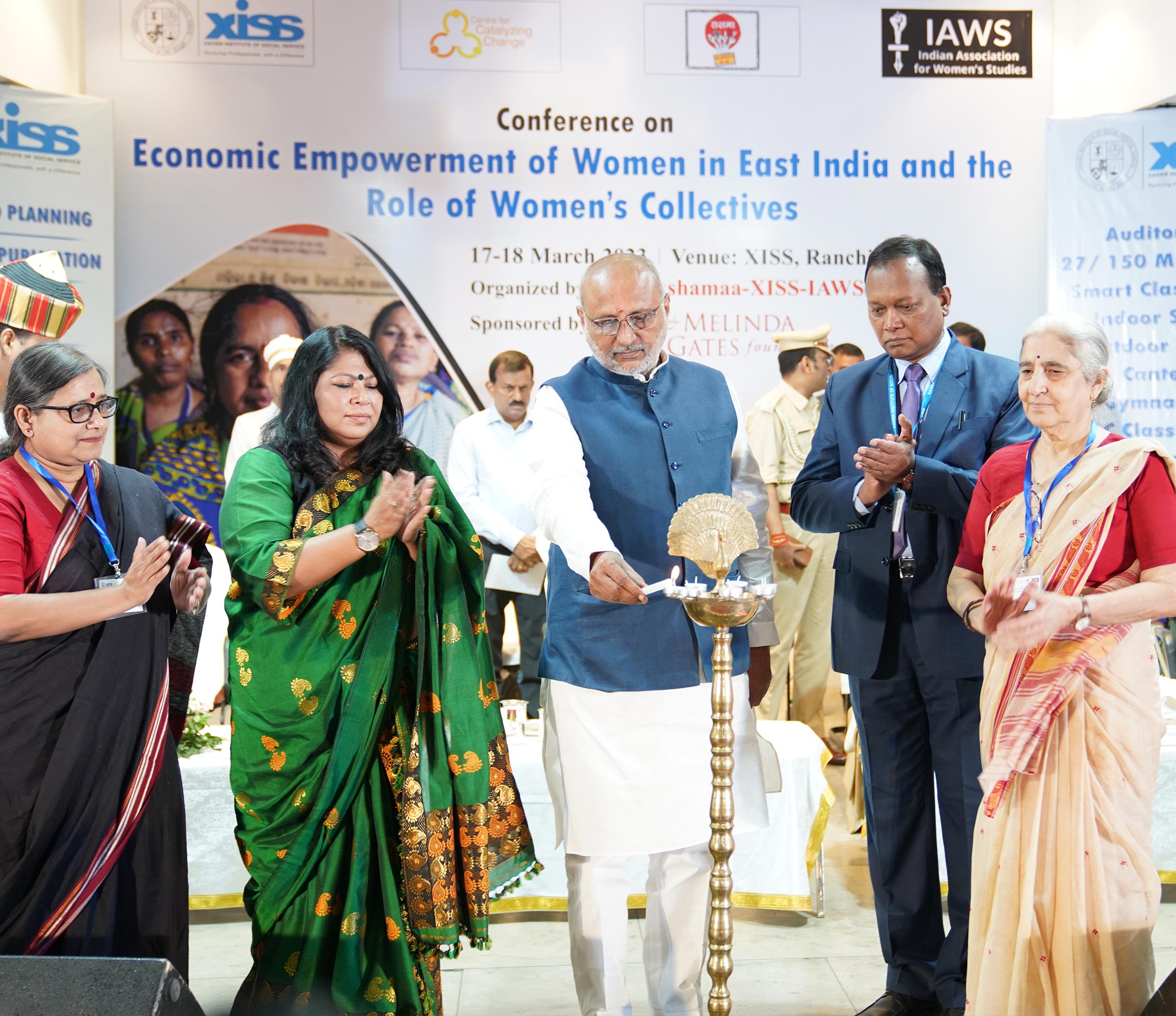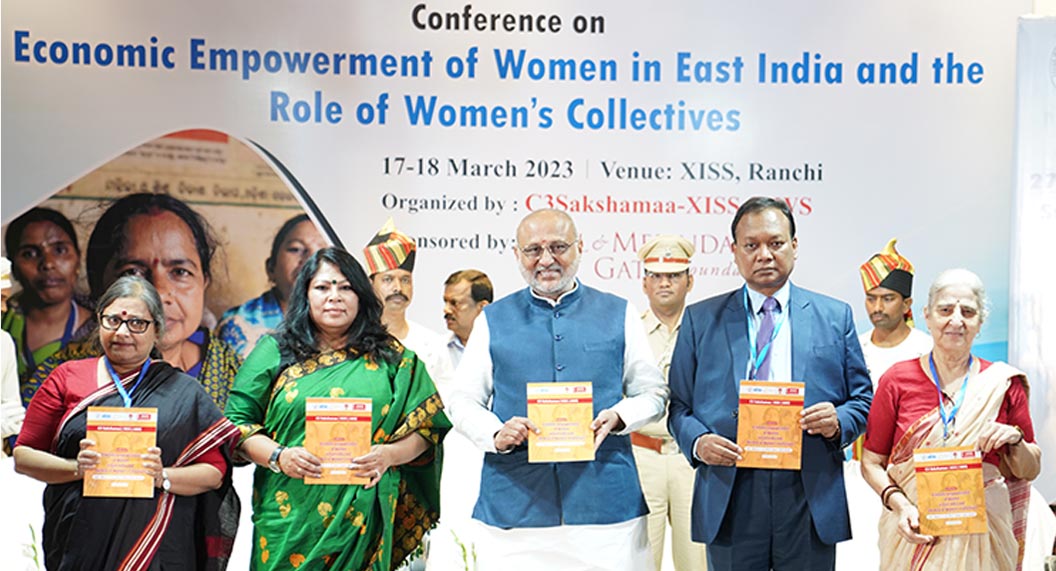Two-day Conference on Economic Empowerment of Women and Role of Women’s Collectives in Eastern India held at XISS
Xavier Institute of Social Service (XISS), Ranchi, Centre for Catalyzing Change (C3 Sakshama), and Indian Association for Women's Studies (IAWS) jointly inaugurated its two-day conference on “Economic Empowerment of Women in East India and the Role of Women’s Collectives” on 17 March 2023 in XISS Campus. The conference was sponsored by Bill & Melinda Gates Foundation. Honourable Governor, Jharkhand, Shri C.P. Radhakrishnan was the chief guest of the Conference.
Women today need to be equipped with education and skills to contribute to the economy, society, and family: Hon'ble Governor Shri C.P. Radhakrishnan
Honourable Governor, Jharkhand, Shri C.P. Radhakrishnan was the chief guest of the conference and in his address, he quoted, “Yatra Naryastu pujyante! Ramante tatra Devata!”, meaning where women are respected, God lives in their home. He highlighted that is a proud moment for the country that Honourable President, Smt Droupadi Murmu, the former Governor of Jharkhand and who still resides in the heart of people here is a supreme example of women empowerment that is getting utmost priority in our country. Honourable Governor in his address apprised and said that women have adorned high position in ancient times and he also mentioned Honourable Prime Minister Shri Narendra Modi’s Beti Bachao Beti Padhao’ scheme in this direction to improve the child sex ratio and girl child education across the country. Citing the status of women in Eastern India, he appreciated the remarkable strides in development indicators over the last few years especially in the states of Jharkhand, Bihar, Chhattisgarh, and Odisha. He also appreciated the crucial efforts of Women’s Collectives and Self-Help Groups (SHGs) in advancing gender equality, promoting women’s empowerment and the impact of SHGs on economic development in Jharkhand which has been significant. He further stated that empowering women have a multiplier effect for increasing economic growth and development. He quoted the World Bank report, 2022, and said that India could boost its growth by 1.5 percentage points per year if just 50% of women could join the workforce. At 14.9%, the present Lok Sabha has the highest number of women since 1952 and over 44% seats in local bodies are occupied by women. SHGs cover about 8.35 crore women, many of whom are leading their federations, and are in leadership positions. He concluded saying that he hopes that this conference becomes a catalyst for further action and collaboration towards achieving economic empowerment for women in East India and that he seeks the outcome coming out of the deliberations and presentations from this National Conference.


Director XISS, Dr Joseph Marianus Kujur SJ addressed the house with his inaugural speech, emphasising the issue of women's empowerment and said that women's empowerment revolves around the social, economic, and political development of women in all arenas of life. He highlighted that women's active participation is imperative as an integral part of the decision-making body. He mentioned that XISS identifies with the need of women empowerment and even spells it out in its vision and mission statements and that our aim with this conference is to initiate a dialogue amongst the policy makers. XISS has taken this initiative to take the case of women empowerment as not just a knowledge disclosure but as a campaign. In his concluding lines, he stated that ‘real women's empowerment is turning crises into possibilities and dreams into reality.’
Mathew Cobb, Founder, Walks Back to Collectives, USA in the inaugural address said that USA being a capitalist country, still lag in delivering equal rights for women and men. He highlighted the importance of motherhood, that women should not be crowned with motherhood only but should also have an equal role in the family. Meanwhile, Dr Aprajita Gogoi, Executive Director, C3, highlighted the importance of C3 in improving the lives of women by focusing at ground level for the last 35 years. She explained the need to emphasise women's collectives of East India and stressed on women empowerment for their overall development. Prof. Ishita Mukhopadhyay, President, IAWS vocalised the need of this collaboration and dialogue to understand, through evidence-based studies and research, the experiences of women in the four states of Bihar, Jharkhand, Orrisa, and Chattisgarh.

The main objective of the conference was to enable a platform for sharing evidence and programmatic experiences of women’s collectives working to facilitate and capacitate women. It meant initiating dialogue between concerned academic institutions, development partners and state governments on the role of women’s collectives in low-income states of Eastern India. It also was a way to envision ways for strengthening women’s collectives in the region to address social norms and deepening the agenda of gender equity.
| The theme of the conference was: • Women Access to Livelihood and Market: Role of Women’s Collectives, Microcredit and the Government • Agency, Empowerment and Women’s Collectives • Digital and Financial inclusion for Capacitation of Women and Their Collectives • Unpaid Care, Domestic Work and Time Poverty for Women: Prospects of Women’s Collectives in Unburdening Women • Prospects for Feminist Networks, Women’s Organizations and Women’s Collectives in Twenty-first Century India • Women’s Collectives in Urban Women’s Economic Capacitation |

More than 100 papers and research works were submitted for this conference, out of which 30 were chosen. During the two-day conference, these papers were discussed in several panel sessions highlighting the importance of the conference. A souvenir of the conference was also released by the Governor and the guests present.
On day two, Prof Sonajharia Minz, Vice Chancellor, Sido Kanhu Murmu University during the Valedictory Lecture said that the aim is to bring change in the community, empower women with decision-making capacity and giving them access to resources. She mentioned that this can be achieved if we enrich our curriculum, revisit our policies, and look out for the gaps where true actions can be initiated. While concluding she stated that our nation celebrates diversity, and unity in diversity should be our motive. She also discussed the state’s rich cultural diversity and the contribution of Jaipal Singh Munda in the context of women's representation in the Constituent Assembly and added that collectively, we need to redefine women's empowerment by reimagining, realigning, and revising our agendas.
Further in the conference, Ms Sonmani Choudhary, Senior Programme Manager, PCI, Patna, presented her research on Women’s Participation in MGNREGA: Creation of Sustainable Individual Productive Assets for Women Under MGNREGA. It was followed up by a research paper presentation on the evaluation of a Start-Up Village Entrepreneurship Programme (SVEP) in Bihar: A Case Study of Women Entrepreneurs in Dhanarua Block in Patna District by Dr Shweta Chandra, Assistant Professor, Amity University, Patna. Mr Rahul Bhushan, PhD Scholar, Aryabhata Knowledge University addressed the Brick Kill Industry of Eastern India: An Economic Space of Systematic Gender Discrimination in his research.

Dr Madhu Smita Sahoo, Assistant Director - Research, Schedule Caste and Schedule Tribe Research Institute, Bhubaneswar focused on the research on Tribal Women SHG Members on Value Addition and Food Processing of Mahua: A Path Towards Women Empowerment. A simultaneous panel was also held were discussions on Women’s Collectives and Urban Women’s Economic Capacity was done Mr Om Prakash, Programme Manager, PCI, Patna.
This discussion examined the Reach of Women’s Collectives (Community-Based Organisation promoted by JEEVIKA and other Government programme like MGNREGA) for poverty alleviation and livelihood diversification. It was discussed that MGNREGA and JEEVIKA target around 22% of the female population in the state and efforts to reach out to the poor population of the state is still needed. Furthermore, Ms Priyanka Banerjee, PhD Candidate, McGill University, Montreal shared the research on Impact of Gender Norms: gaps in skills and care burdens are important obstacles for women’s livelihood generation. Ms Wajda Tabassum, PhD Scholar, National Institute of Education Planning and Administration (NIPEA), Delhi focused on the poor condition of Muslim women involved in home-based embroidery works in eastern Uttar Pradesh in her paper.

The day proceeded with a certificate distribution ceremony between the guests, paper presenters, and students who attended the conference. The vote of thanks was given by Dr Anant Kumar, HoP of Rural Management Programme, XISS. The conference was also attended by Dr Pradeep Kerketta SJ, Assistant Director, XISS, Dean Academics, XISS, Dr Amar Eron Tigga along with Heads of all Programs at XISS, Faculty, Representatives of C3 Sakshama, IAWS, Academicians, Practitioners, Alumni, Staff, and Students of XISS.
To read more on the papers presented and proceedings of the day, click on the link below to read the souvenir of the conference:





